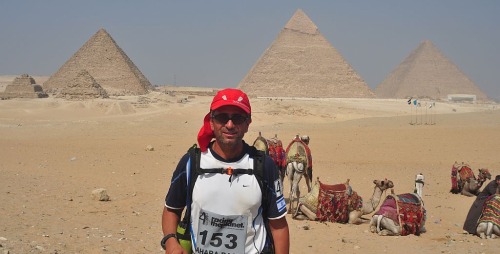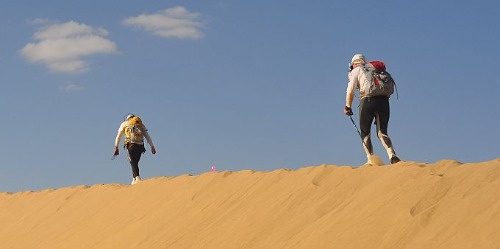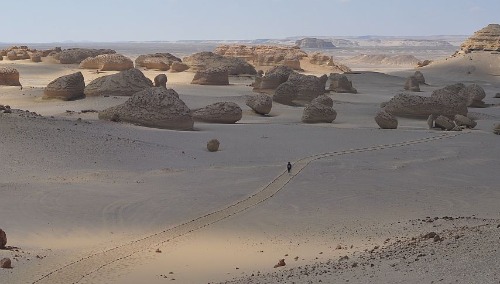Israeli runner Hezi Yitzhak’s race across the Sahara Desert in the toughest footrace on earth was even more arduous and challenging than he had anticipated.

It started out so badly. As the 156 runners gathered in Cairo for the annual six-day, 250-kilometer (155-mile) race across the Sahara Desert, Egyptian security officials suddenly told Hezi Yitzhak, the sole Israeli competitor, to get off the bus.
“The security officials just said that I did not have permission. They didn’t say why,” Yitzhak, a high-school physics teacher from Kibbutz Sde Boker in the Negev desert of southern Israel, tells ISRAEL21c.
The bus taking the competitors to the starting line in Fayyum City, some 150 kilometers (about 93 miles) south, in the desert, eventually drove off without him. Forty-eight-year-old Yitzhak, who had been training for eight months for the October event – one of the hardest foot races in the world – contacted the Israeli embassy in Cairo. He ultimately reached Shmulik Rifman, head of the Ramat Hanegev local council who has many contacts in Egypt.
“As I understand it, the message reached President Shimon Peres’ secretary, who contacted [Egyptian intelligence chief] Omar Suleiman,” says Yitzhak.
Twenty-four hours later, permission to compete in the race across the Sahara desert – the hottest desert on earth – was finally granted, and Yitzhak arrived at the camp at the close of day one, missing the first leg of the race.
His fellow participants, from 36 countries, were surprised and happy to find him there the following morning. But Yitzhak, frustrated at missing an important leg of the adventure, was in no mood to eat breakfast with them – a decision he was to regret.
Twenty-five kilometers (about 15 miles) into the race, he began to feel weak and ill, his muscles cramping due to low salt levels. He was taken to a first-aid tent and after two fluid infusions had recovered enough to continue. “I decided that I wasn’t going to stop – but I would proceed at a slower pace,” he recounts.

Yitzhak, who admits that his first love is mountain biking, first became interested in running when he participated in the Tiberias marathon three years ago. “I did it for the challenge, to prove to myself that I can,” he says. “In time, I started to enjoy running, although it’s much harder on the body than cycling. On foot it’s all about your body – when you’re riding a bicycle the machine plays its part.”
“It’s insanity”
The Sahara Race was his ultimate test – part of “The Four Deserts,” a series of four six-stage, seven-day-long rough country footraces across some of the most inhospitable deserts on Earth. The others are across the Gobi Desert in China, the Atacama Desert in Chile and the Last Desert in Antarctica.
“I’m crazy about deserts,” admits Yitzhak, who not surprisingly is also a researcher at the Jacob Blaustein Desert Institute of Ben-Gurion University of the Negev. “I’ve been living in Sde Boker for 20 years. I’m a ‘desert person,’ and cannot see myself ever leaving.”
Yitzhak began preparing for the Sahara event eight months in advance of the race, with an onerous training schedule that included daily two-hour runs through the Negev desert, at the hottest time of day. “It was hard, I admit,” says Yitzhak, who has subsequently completed Israel’s first 100-mile ultra-marathon.
Earlier this summer, together with a friend, he ran from Wadi Ram (in Jordan) to Avdat – 180 kilometers (about 112 miles) in four days. “It was not an easy experience – it was mid-June, and we had to conquer the heat. But arriving home was a fantastic feeling,” he says.
The Sahara race, however, was even harder. The reality was one of relentless, blistering heat and soft sand dunes. “I was up at 4:30, with first light, every morning. You walk and run for 35 or 40 kilometers [about 22 or 25 miles] a day – 95 kilometers [59 miles] on the last day – carrying all your clothes and food with you. It’s more than just a challenge – it’s insanity,” Yitzhak concedes.
Akin to military service
“It’s hard to explain why I did it. I prefer to do things individually, not in an organized fashion. I’m an amateur – for me it was about finishing. Others treated it as a race.
“I also had to think about my equipment – what to take and what to leave at home,” he continues.
His pack contained all his food for the journey (mainly energy bars, sugar and halva), clothes, a compass, a whistle (for emergencies) and necessary gear for desert survival. There was some dried sage from his garden to have with hot tea in the evening. He also packed a miniature Book of Psalms – a present from his mother – and a prayer book.
“I was too heavy, in retrospect,” says Yitzhak. “My big mistake was taking along an expensive camera – I hardly took any photos in the end.”

He wore the same pair of shorts throughout, but changed his T-shirt for a long-sleeved shirt after a couple of days because of sunburn. “I changed socks every second day. It reminded me of my military service,” says Yitzhak, a former officer in an elite Golani battalion.
In fact, the military was the one association he couldn’t shake. “The experience transported me back to those painful night marches in basic training. As an Israeli, I’m familiar with such difficulties and it helped me to get through this one. I drew strength from that experience.”
Alone in the Sahara
This was especially true on the final day, with the longest, 95-kilometer-stretch (59 miles), which started with first light and carried on well into the night.
After 55 kilometers (about 34 miles), the competitors were allowed a few hours’ sleep, “but I preferred to keep going through the night, because it’s so hot in the daytime. I walked, in total solitude, throughout the night by flashlight. I actually enjoyed being alone in the Sahara – alone with my thoughts.”
He endured long hours trudging through the sand, trying to ignore the pain in his legs and feet, and reached the last rest stop at first light. “I knew the end of the journey was approaching. I asked the organizers to let me go back one stage so as to complete the missing kilometers, but they wouldn’t take responsibility for that and I had to relent.”
Once past the finish line near the Giza pyramid, the runners celebrated with pizza and beer. Like the others, Yitzhak received a medal for his efforts, but no Israeli flag was hoisted during the medal-giving ceremony. “That saddened me, but I understood that they wanted to avoid any problems.”
To walk across the Himalayas
A fluent Arabic speaker, Yitzhak struck up an easy rapport with his Egyptian hosts. “I was well accepted by all the competitors; there was no problem at all. They hardly mentioned politics. They were more interested in my field of expertise, and I found myself explaining to them how dunes are formed and shift, and the properties of sand. I actually brought a few sand examples home with me,” he relates.
The participants slept 10 to a tent. Yitzhak’s tent mates were two Japanese, two Brits, a father and his two children from America, and a Swiss couple on their honeymoon (who carried a sign that read “Just married”).
Conversation between participants was limited, and people barely exchanged a word in the evenings. “Everyone is tired, thinking about tomorrow, preparing their equipment and treating their blisters – we all had them,” says Yitzhak.
Now he’s keen to run the next race, in 2012, which passes through Israel and Jordan. “I would really like to see the event pass through the Negev,” he says.
Undeterred by his Egyptian adventure, Yitzhak says, “I’m just happy I did it.” But his mind is focuses on the future: “I’ll continue to take on challenges, but not this one again. I dream of crossing the Himalayan plateau by foot. Running at 5,000 meters (16,404 feet) – now that sounds like the kind of thing I’d like to do next.”












